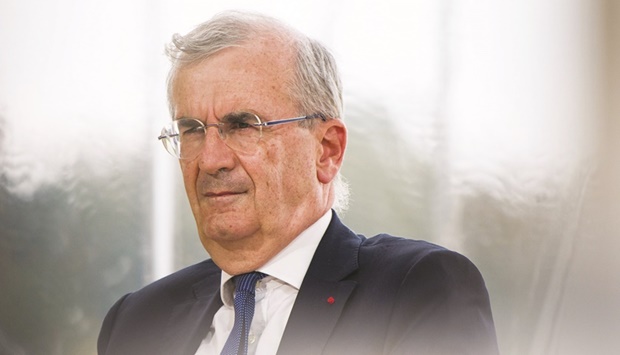European Central Bank (ECB) Governing Council member Francois Villeroy de Galhau said interest rates may be raised back above zero this year if the eurozone economy doesn’t suffer another setback.
In a speech in Paris, the Bank of France chief also suggested that the ECB should conclude net bond purchases at the end of June – a necessary precursor to raising the deposit rate from its current level of -0.5%.
“The three conditions of our forward guidance on interest rates are, according to my personal judgment, fulfilled,” Villeroy said. “Barring unforeseen new shocks, I would think it reasonable to have entered positive territory by the end of this year.”
The comments by one of the 25-member Governing Council’s more moderate but influential policy makers add impetus to plans to roll back years of stimulus that record inflation has made obsolete. They come in a week of bumper hikes in borrowing costs, from the US to Iceland to India.
Money markets are pricing in a quarter-point increase in July and raised bets on the pace of tightening beyond that, seeing two more moves of that size by October. German two-year bond yields rose.
Villeroy’s plans are among the more ambitious to date on how quickly the ECB should now act. Money markets are already betting on a quarter-point rate increase in July and 93 points of tightening by year-end.
A growing number of officials has suggested lifting rates at the ECB’s July meeting, with Finland’s Olli Rehn becoming the latest to do so on Thursday. Belgium’s Pierre Wunsch has also said rates may turn positive this year.
Villeroy was less precise about the exact timing of liftoff, saying “while I wouldn’t preclude the next few Governing Council meetings, I would rather set a marker a bit further down the road.”
He said the ECB’s push to normalise policy “will be guided by an active use of optionality and gradualism.”
Some are more cautious. Executive Board member Fabio Panetta said in remarks published Thursday that Europe’s economy is “de facto stagnating.” He said it would be imprudent for the ECB to act without first seeing second-quarter economic figures, which only arrive on July 29.
On asset purchases, Villeroy said “seen from today the case for continuing to press the accelerator and adding further net purchases after June is not obvious.” Such a timetable would still leave open the possibility of an interest-rate increase in July.
The Bank of England and the US Federal Reserve both raised interest rates this week, making the ECB look increasingly isolated with its comparatively slow approach.
One concern among officials is that investors could shun the bonds of more highly indebted euro-area countries. The ECB has vowed to address any unwarranted fragmentation on financial markets.
Villeroy said that the central bank could resume “targeted net purchases” under its pandemic bond-buying programme, if needed. On possible measures beyond that, he said “we don’t need to be specific about technicalities: the precise design of a new instrument, or the conditions which would trigger appropriate interventions.”

Francois Villeroy de Galhau, ECB Governing Council member.
